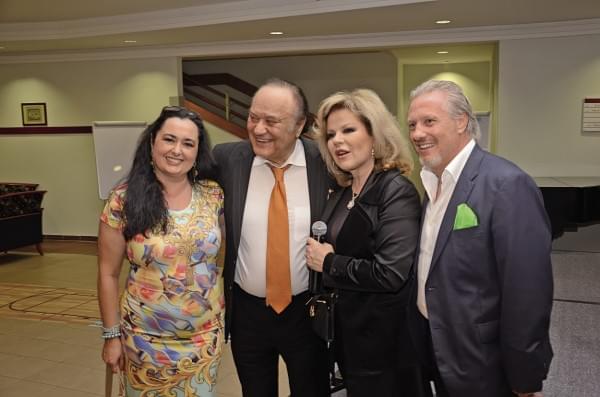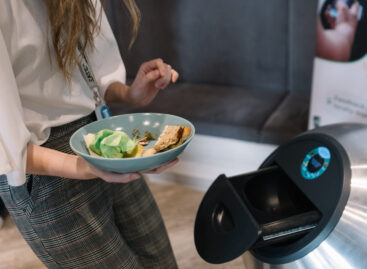Ready, steady, go – Hungary! (Business Days 2014, Part 1)
This year’s Business Days conference was 4-day long. Held in Tapolca’s Hotel Pelion and organised by Trade magazin and the Chain Bridge Club, the event attracted nearly 500 participants. Trade magazin editor-in-chief Zsuzsanna Hermann welcomed participants on the morning of the first day. After her words of welcome Zoltán Tóth, managing director of MindZ and Otília Dörnyei, client service director of GfK Hungária presented the results of the collective study on the new tasks of sale organisations and the challenges ahead of them, made by the Chain Bridge Club, MindZ and GfK. In the second half of Tuesday afternoon Randstad managing director Sándor Baja was the moderator. Participants of the roundtable discussion were Ottó Németh, marketing director of Henkel and sports manager Stefano Favaro, the organiser of Budapest Jump. In his introduction Mr Baja told that sponsorship can be integrated into every element of the marketing mix. Mr Németh spoke about how Henkel started working with Balázs Szalay (Dakar rally) and Gábor Talmácsi (motorcycle racing) back in 2007. Today the company focuses on the Dakar rally, where competition is just as strong in marketing as in the race itself, so sponsor demand is served at the highest level. Mr Favaro spoke in Hungarian as he has been living in Hungary for 23 years. He is organising a mega-motorsport event for the summer of 2015: Budapest Jump is unique in Europe, it is a motorcycle race, show and festival in one. The event will be held in two phases, in the Groupama Arena and at the Hungaroring motor-racing circuit. Wednesday morning started with the retail roundtable discussion. Ákos Kozák, managing director of GfK delivered the keynote speech, who told that from a consumption perspective Hungarian society is pear-shaped, with a narrow upper class, a weak middle class and well-separable lower classes. His conclusion was that low real wages not only hold back consumption but also break apart the structure of society. Members of the roundtable discussion were of the opinion that we can be hopeful because consumers’ willingness to purchase finally increased this year, but CBA purchasing director Zoltán Noszlopy warned that consumers use their extra income to buy consumer electronics and not FMCG products. METSPA managing director László Hovánszky added that the hardships of recent years took consumers off the beaten path of controlled retail trade. However, Tibor Kujbus, the director of Reál Hungária revealed that their stores weren’t really affected by negative tendencies. Gábor Ambrus, purchasing director of Auchan talked about how they had changed their communication strategy because of the changes in society. Eric Tavoukdjian, the marketing director of Tesco Hungary shared the details of their multichannel approach and talked about the fact that retailers have to accept the fact: consumers want to decide themselves where and how to do their shopping. László Flórián, managing director of Rossmann said online selling isn’t a wonder weapon in the short term but it can’t be avoided in the long run. Jean-Sebastian Blum, the head of purchased at METRO shared his view that retail is going in the direction of services, therefore retail chains need to reinvent themselves. Tamás Nyíri, managing director of SPAR called attention to the fact that online shopping is only attractive to a certain generation and a narrow layer of society. Elza Pálenik, METRO Hungary’s lead operation QA manager gave a presentation about the new tracking solutions they use in stores. The biggest development was adopting the GS1 Databar system at fresh and ultra fresh product departments. In the second part of the discussion this year’s perspectives were discussed. Tamás Csongovai, the head of purchasing at Coop revealed that so far in Coop stores fresh product and non-food sales expanded above the average – but there was a decline in basic food product sales. Örs Országh, innovation expert with Magyar Telekom and Norbert Hovanyecz, the managing director of SuperShop told that the testing period of the mobile wallet had ended in July – more than 1,000 people had been involved in the pilot project – and the service would be launched already this year. The lesson they learned was that they needed to concentrate on building the background system and not on the final step, the act of payment. After lunch György Jaksity, the president of Concorde Zrt. delivered the first presentation in the macroeconomics section, analysing the relationship between economic well-being and happiness. He used the UN’s World Happiness Report study too and found that being well-off is more likely to make people happy than being poor, but the growth in income doesn’t necessarily make people happier. In this respect relative income is much more important. He stressed the role social capital plays in happiness in society. In his view people will be happier if they also try to make others happy. He shocked the audience with the fact the UN happiness index of Bhutan, the world’s poorest country, is one degree above Hungary’s. Gergő Soltész, the CEO of FHB Bank took the floor next. He shared the market’s forecast with participants: the inflation level and the base rate will only rise a little until the end of 2015 from the current record low. This could entail an increase in the willingness to take out loans, which would induce higher consumption level. The CEO said the big question is: Will the GDP momentum measured in the first and second quarter of 2014 continue? In his view the recent good performance was the result of many one-off effects. He added that certain components which may fuel economic growth do exist, for instance the money to be paid by the bank sector to individual customers or EU funding which doesn’t have to be paid back. Judit Szalókyné Tóth, managing director of Nielsen Hungary told in her presentation that the Hungarian FMCG market speeded up in terms of both value and volume, and stores sold 3.7 percent more products in the first half of 2014 – this was one of the best performances in Europe. According to Nielsen measurement data, the key driver of growth was groceries as sales improved by 5.3 percent; sales of household chemicals and cosmetics increased 1.6 percent. In connection with the sustainability of this sales growth, the managing director called attention to the fact that the Nielsen consumer confidence index has been on the rise for three years, and the 56 points measured in the second quarter of 2014 is the highest value since the fourth quarter of 2010. At the end of the work in the section Gábor Kun, deputy CEO of the Hungarian National Trading House (MNKH) gave a presentation. He explained that by integrating HITA the government’s export stimulating initiatives are now controlled centrally and the focus is on the strategy of ‘opening towards the East’. MNKH has two separate networks dealing with strengthening economic relations inside the European Union. (To be continued)
Related news
Related news
Ski season: an emergency can cost hundreds of thousands if we don’t prepare consciously
🎧 Hallgasd a cikket: Lejátszás Szünet Folytatás Leállítás Nyelv: Auto…
Read more >






